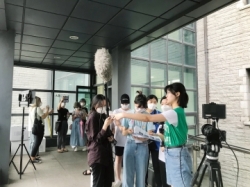The economic impact that has snowballed across the globe stemming from the COVID-19 pandemic has hit industries across the board. The film industry was no exception and the indie film industry stands to lose the most. Unlike big-budget productions, indie films, which generally aim to provide creative commentary on societal issues regardless of commercial value, find themselves in a tough situation.
On April 22, The Association of Korean Independent Film & Videos (KIFV) mentioned on its Facebook page that their survey consisting of 75 individuals and organizations found that 42 percent had no income over the peak periods of the COVID-19 pandemic, which is still ongoing.
Despite these unforgiving circumstances and times that the indie film industry is facing, many indie film makers in Korea are determined to see it through. Their convictions that indie films are powerful drivers of social change inspire them despite the circumstances.
Noue, an indie film club at Ewha, which was established in 1984 has been creating short films that challenge, what Noue sees as, social injustice. Lee Hyo-rim, the president of Noue, sees the club aiming to further stimulate students’ interests in indie filmmaking.

According to Lee, low production costs are both indie films’ biggest challenge, and largest advantage. Indie films rarely receive sponsorships and are often made using the director’s own funds, which limits cinematic quality. However, because of this the director has full control of movie that often resonates with many people.
“Movies like ‘House of Hummingbird’ received international attention by dealing with new perspectives,” Lee said. “The movie portrays the life of a girl, slowly and calmly capturing the painful maturing of an individual. Despite having a rather simple plot, it greatly moved the audience.” House of Hummingbird won 50 domestic and international film awards.
Lee believes the role of independent films is to give the audience opportunities to think about the lives of different individuals and reflect this upon themselves. Recently, during summer vacation, Lee’s indie film club Noue, produced indie films that focused on independent female protagonists. ‘Show, Show, Show,’ for example, illustrated the delicate emotions of a female student experiencing the difficulties of finding employment.
Another student club, Ending Credit, made up of students from Yonsei and Sungkyunkwan University, is dedicated to producing movie magazines for people in their twenties. Ahn Jae-yeon, and Cho Shu-a, the magazine’s editors, both place great importance on indie films and the impact they can have on people’s lives.

“If indie films ceased to exist, it would mean losing the voice of minorities,” Ahn said. “Indie films are special because they focus on less mainstream subjects that are not spotlighted in commercial films. To watch indie films and invest in them means protecting what is smaller but equally important.”
An example, according to Ahn and Cho, of these smaller but equally important topics, is the film ‘A Boy and Sungreen,’ that delves into the concept that accepting the impermanence of life will make you feel happier.
Despite these important messages that indie films aim to present to viewers and society at large, the industry is facing a tough uphill battle with financing, distribution and growth. New platforms such as IndieGround, which is officially launching in December, are being developed to combat the challenging situation. Lee Ji-yeon, from IndieGround, said the platform will act as a distribution hub that networks people and aims to create a huge indie film network to further push out the work to the masses.
“I believe indie films are more interlinked with our lives than any other form of media,” Lee said. “There are countless movies that university students will greatly relate to, so I hope students can watch more indie films.”

